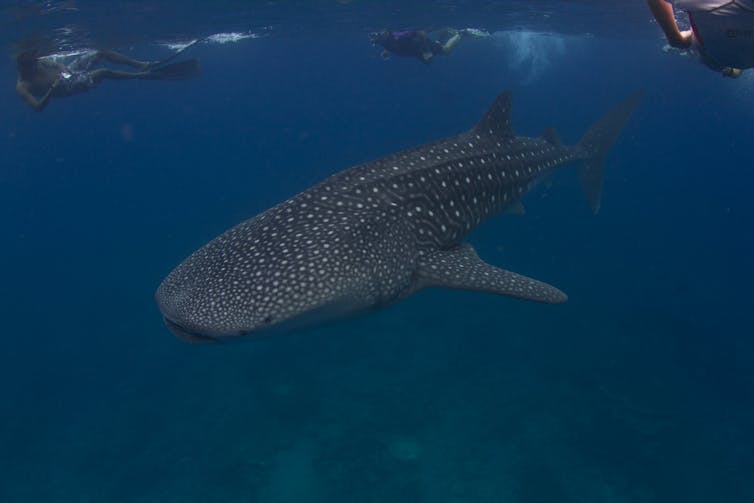Menopause treatments can help with hot flashes and other symptoms
Menopause used to be a taboo topic in many quarters. Now, it’s frequently in the news.
In March 2024, the White House announced an initiative to “Galvanize New Research on Women’s Midlife Health.” In May, Sen. Patty Murray introduced bipartisan legislation that would spend US$275 million to improve menopause care and midlife health.
The actor Halle Berry went to Capitol Hill to help draw attention to the measure. While she was there, she shouted: “I’m in menopause.”
This new focus on menopause and the greater openness to talking about it is occurring at the same time as scientific studies are underscoring the benefits of hormone therapy to treat menopausal symptoms – two decades after it suddenly fell out of favor.
The three of us believe open discussions about menopause are long overdue. We write and teach about employment discrimination, aging and the law, and feminism. Having teamed up to write a book about menopause and the law, we are closely following the changes in how researchers assess the benefits of hormonal treatment and what that means for its availability.
Menopause basics
Technically, menopause is a point in time. It typically starts 12 months after the last menstrual cycle and marks the end of fertility, and it usually occurs between ages 45 and 55. It’s preceded by perimenopause, a transitional phase during which menstruation changes but continues, that can last as long as a decade.
People who have gone through menopause are in postmenopause for the rest of their lives.
Menopause results from the body decreasing production of estrogen and progesterone, two hormones made by the ovaries. In the long term, estrogen loss also affects bone density, the cardiovascular system and other parts of the body.
Menopause can also occur early and abruptly, such as after the surgical removal of the ovaries.
Each year, more than 2 million Americans reach menopause. Millions more are experiencing perimenopause at any given time.
While the average age of menopause is 51, there is variation along racial, ethnic and income lines. As life spans get longer, half the population may spend one-third of their lives in postmenopause.
In particular, Black women tend to experience menopause earlier than white women. Their symptoms, such as hot flashes, are more acute, and those symptoms last longer. But Black women are less likely than white women to receive medical care for these symptoms.
What about perimenopause?
During perimenopause, which typically begins after age 40, the body gradually stops making estrogen – often bringing on menopausal symptoms. It can be hard to know whether someone is experiencing perimenopause, as estrogen levels fluctuate and there is no definitive test to determine it.
The most common symptoms are hot flashes and night sweats .
Other symptoms include sleep problems, depression, brain fog and vaginal dryness. Periods become irregular, and bleeding may be heavier. Not everyone going through menopause experiences symptoms – although 85% do – and their severity varies.
Hormonal treatment and controversy
Menopausal hormonal therapy, including estrogen alone and estrogen combined with progesterone, has been prescribed to help with those symptoms for decades. Hormones were also used to treat the long-term risks associated with menopause, including heart disease and osteoporosis.
By the year 2000, approximately 1 in 4 women used hormonal therapy. Then, in 2002, the preliminary results of one study shook the medical world.
They were from the Women’s Health Initiative, a placebo-controlled study of menopausal hormone therapy that recruited thousands of women to analyze this treatment. Launched by the U.S. government’s National Institutes of Health in 1991, it remains the largest women’s health prevention study ever conducted.
In 2002, an interim analysis found that menopausal hormone therapy was associated with an increased risk of breast cancer, coronary heart disease and stroke. The research was halted because of these results.
Within a few months, the use of hormone therapy to treat menopause symptoms fell by almost one-half. The share of all women using these prescription drugs plummeted to 4% within two decades and has been slow to bounce back despite the growing recognition of the limitations of the 2002 study.
A more complex story about menopausal hormone therapy has emerged in recent years, along with a careful review of the conclusions that led to the early termination of significant parts of the Women’s Health Initiative study.
One concern is that the typical age of the women participating in that study was 63, meaning they were many years beyond perimenopause when they enolled in it.
Another was that the study focused on the role of hormones in the prevention of chronic disease, rather than the alleviation of menopausal symptoms. A third was that it only evaluated one form of hormonal treatment.
Treatment today
Fittingly, many doctors are prescribing hormonal therapy for menopausal symptoms more frequently today – particularly for women who are under 60 when they begin to take it and had their last periods within the prior decade.
Hormonal therapy can be dispensed through tablets, skin patches, gels or vaginal suppositories.
Tablets offer the convenience of oral administration, while skin patches provide a steady release of hormones through the skin. Gels allow for easy application and absorption through the skin, offering flexibility in dosing. Vaginal suppositories target local symptoms such as dryness and discomfort more directly.
It is also available with synthetic or bioidentical progesterone, although it’s not clear that those versions are safer or more effective.
However, there are patients with underlying conditions for whom hormonal treatment is riskier than for others and should be avoided, including those with a history of breast cancer, other estrogen-sensitive cancers and coronary heart disease, among other conditions.
New, nonhormonal treatments for hot flashes are in development, too.
In 2023, the Food and Drug Administration approved fezolinetant, sold as Veozah. It’s the first drug designed specifically to treat hot flashes and night sweats.
A second new drug may be marketed soon.
Antidepressants, epilepsy medications and other nonhormonal drugs are also being prescribed off-label to treat some menopausal symptoms.
Moving forward
Unfortunately, many patients and even health care providers aren’t fully aware of the latest evidence about effective treatments for menopausal symptoms.
Rates of menopausal hormone therapy use varies by race and ethnicity: White women have the highest rates, while Black and Hispanic women have the lowest. Without insurance, a month’s supply of generic estrogen costs approximately $29. With insurance, costs may be much lower.
What all of the research shows is that symptoms should not be ignored, and individualized treatment is key. Given the new openness to discuss and deal with menopause, as well as potential research funding and new treatments, we’re becoming more optimistic that this inevitable life stage may finally get the attention it deserves.
This article was updated on June 10, 2024, to correct a reference to menopause brought about by surgery.![]()
Naomi Cahn, Professor of Law, University of Virginia; Bridget J. Crawford, Professor of Law, Pace University , and Emily Gold Waldman, Professor of Law and Associate Dean for Faculty Development, Pace University
This article is republished from The Conversation under a Creative Commons license. Read the original article.







